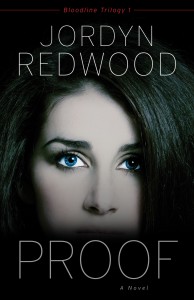Today’s guest blogger is Jordyn Redwood, a pediatric ER nurse by d ay, suspense novelist by night. Her Bloodline Trilogy, Proof, Poison and Peril, are medical suspense books. In those, she shows how to build tension. Today, she tells us about dealing with one star reviews (not that she has to deal with those).
ay, suspense novelist by night. Her Bloodline Trilogy, Proof, Poison and Peril, are medical suspense books. In those, she shows how to build tension. Today, she tells us about dealing with one star reviews (not that she has to deal with those).
Reading reviews is an author conundrum. Do I? Don’t I? Do I take to heart what the reviewer writes and use it to improve?
Often times, I think authors dismiss one star reviews without taking into consideration the content of the review. Personally, even if I don’t like a book, I find it hard to dole out a one star review to a fellow author because I know how hard it is to complete a manuscript.
One thing that doesn’t help an author take one star reviews seriously are those that use one star reviews as a revenge tactic or social group think to drive a book’s rating down because they don’t like the author, don’t like the message of the novel (this is separate from how well the novel may have been written), or as part of a mass mob of people who assume the book is about something but haven’t read it. I do read one star reviews—my own and those given to other authors and there are some interesting trends among one star reviews that I think all of us as writers could learn from.
They do have value.
Here are some top reasons why readers give one star reviews.
- A likeable character could not be found. All novels need tension and conflict but readers also need someone they like to root for. We like to be able to cheer someone on to overcome the obstacles they’re confronted with. If the characters have no redeeming qualities, the reader is going to have a hard time staying on board your novel train. Ensure your hero or heroine does something likeable in the first few pages to get the reader to bond with them.
- No hook in the first five pages. I’m generalizing here but there are a finite number of pages that you have in order to get the reader hooked before their attention gets drawn away by any number of other factors. This is common among newer writers where their warming up pages are the first part of their novel. I’ve judged a number of contests and it is very common to see that the real story starts about page five. Look closely at your story. Ask another person to read your manuscript and have them answer this question, “At what page did my story capture your attention?” That’s the start. What comes before is generally back story or fleshing out characterization.
- Lack of tension/conflict. In writing circles you’ll often hear this called, “Happy people in happy places.” You don’t have a story if you don’t have conflict.
- Formatting/Editorial Issues. This can be true for even traditionally published novels—more on the e-book side that the formatting is too distracting for the reader. But it cannot be said enough that all published novels need an editor. Period. And you can’t be your own best editor.
- Taste. Some people give one star reviews because they just didn’t like the book and that’s okay—as long as they read the book they are entitled to give their opinion. But look at trends in this category—are there some common threads that you could learn from and change?
 One star reviews can be valuable. As with every critique, there is always something that can be learned. The professional writer is open to what a one star reviewer has to say.
One star reviews can be valuable. As with every critique, there is always something that can be learned. The professional writer is open to what a one star reviewer has to say.
How do you handle one star reviews? What have you learned from them?
JIM: Share your thoughts on one star reviews. Thanks.

Over the years I have read countless numbers of novels and texts. When I see a 1 review, I become curious. I’m not always driven by a single person’s review. But, I figured if they took the time to write a review, there might be a snippet of information within the read that might be worth reading. Do I always trust 5 stars, I’m suspicious.
Jordyn, this is some great advice for writers! You definitely need thick skin as a writer, but as you mentioned, reading the entire review will give you a better idea as to whether the critique is valid or not. I accept that my writing is not to everyone’s taste — it would be impossible to be loved by everyone, and that’s okay.
I have read some shockingly poorly written books that I have not reviewed because I don’t want to seem mean-spirited or vindictive. I have a rule that I will only review books I can give at least three stars to, otherwise I just don’t review it.
Sometimes one star reviews bother me and sometimes they don’t. I think that mostly, the reviewer is being nasty for a specific reason. It is rare that a book does not have a single likable character. It’s just the reviewer’s position. A late hook can be a problem, but more often for books written decades ago than ones written today.
“No tension” can be lumped under editorial issues. Every book needs to be edited, and any writer worth his salt knows that. Having said that, readers need to understand that in a big publishing house, the author is not the last person to see the book, so the mistakes may not have been caused by the writer.
Some reviewers attack the writer, and call them names. I’ve been accused off all sorts of things.
But my biggest complaint against reviewers is that they assume the way they speak is correct and all other ways to convey a thought must be wrong. English is a wonderfully fluid language and reading widely is like traveling into the minds of writers who may not have been brought up in your home town.
So don’t rip them apart because they put the adverb in a different spot!
You make some sound comments on one star reviews. I wish they all held just one of those kernels of information you allude to, then all of us writers could stop pulling out our hair.
I definitely get this. Constructive criticism is always better than just saying, “This is the worst book I ever read!!”.
This is a perceptive post. There’s a feel-good slogan among us publishers that “there’s no such thing as a bad review.” I do worry that one-star reviews are often caused by personal grudges, as Jordyn points out, and I feel such reviews are indeed bad–mean-spirited and unhelpful. But a negative review that is intelligent or at least well-meaning could be quite helpful, if the writer isn’t too thin-skinned to accept constructive criticism.
John,
I agree with you but hopefully the readers of such reviews can tell the difference between someone holding a vendetta and someone offering a well thought out critique.
I thought your advice was very helpful and informative for the new writer – This is what they need to hear LOONG before they publish a book or experience a starred review… and hopefully not a one star. 🙂
Thank you, Elaine!
Appreciated your comments on one star book reviews. I’m always suspicious when a friend reads something I’ve written and says it is just wonderful and they wouldn’t change a thing. There is always room for improvement. I truly appreciate friends that say, “Chapter 3 sucks. You need to fix it.” Or, “I just can’t ‘see’ the character.” I think some people are afraid of hurting my feelings. A pat on the head and praise isn’t much help when I really need to rewrite, edit, or simple start over..
Galand,
This is such a great attitude to have as a writer. Being open to constructive criticism and fixing the manuscript– always striving to learn makes you into a craftsman.